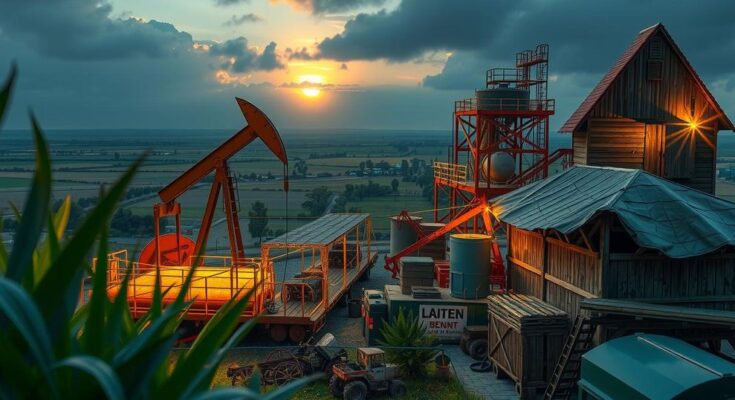Benin’s economy has relied on external support since independence, transitioning from a socialist regime to a privatized structure in the 1990s. Agriculture employs about 70% of the population, with the country achieving self-sufficiency in staple foods. Industrial growth is notable with various manufacturing plants, while trade remains focused on agricultural exports amidst a challenging trade balance. Transportation infrastructure supports economic activity, with ongoing reliance on foreign aid for development projects.
The economy of Benin has faced persistent challenges since its independence, relying significantly on external support, predominantly from France and international organizations. Efforts to restructure the economy under a socialist regime starting in 1975 resulted in nationalization and a shift away from dependence on French aid. However, despite the restructuring, issues of corruption persisted, and the intended improvements were not realized. In the mid-1980s, economic liberalization and subsequent privatization began to shape the economy anew, yet did not lead to immediate success.
Agriculture plays a critical role in the lives of the populace, with about 70% of the workforce engaged in this sector. Since the mid-1980s, the country has achieved self-sufficiency in staple crops such as yams and cassava while witnesses a significant rise in cash crops like cotton and cocoa. Fishing and livestock farming are also essential components of Benin’s economic activities, contributing to the livelihood of many citizens.
In the industrial sector, several manufacturing plants and processing facilities have emerged, focusing on palm oil, cement, textiles, and beverages, among others. Electricity generation relies on thermal plants and imports, particularly from Ghana. The financial sector has transitioned from state-owned to private, facilitating a more robust banking environment, with ongoing foreign aid supporting developmental initiatives.
Trade remains heavily reliant on agricultural exports with cotton, palm oil, cocoa, and coffee being significant contributors. However, informal trade with Nigeria complicates the trade balance. Benin’s deepwater port at Cotonou stands out as a critical asset, enhancing its trade capabilities. The nation regularly imports various goods and maintains vital transportation networks, including roads and railroads, supporting economic interconnectivity.
Overall, Benin continues to navigate the complexities of economic development shaped by its agricultural reliance, resource management, and regional trade dynamics.
Benin, a West African nation, has a challenging economic history influenced by colonial legacies and political shifts since gaining independence. The country’s economy was heavily reliant on agricultural exports and external financial aid, primarily from France. Post-independence policies sought to restructure the economy; however, difficulties such as corruption and ineffective liberalization undermined those early efforts. The resurgence of privatization in the 1990s marked a significant transition in the economic landscape, prompting a new phase of development. Understanding these historical contexts is essential to grasping the current economic state of Benin.
In conclusion, Benin’s economic landscape illustrates the complexities of transitioning from a historically dependent economy to one striving for self-sufficiency and diversification. Key sectors such as agriculture, fishing, and emerging industries remain pivotal to its growth. Continued efforts in trade improvement and infrastructural development, along with the strategic exploitation of resources, will determine the future trajectory of Benin’s economy.
Original Source: www.britannica.com




